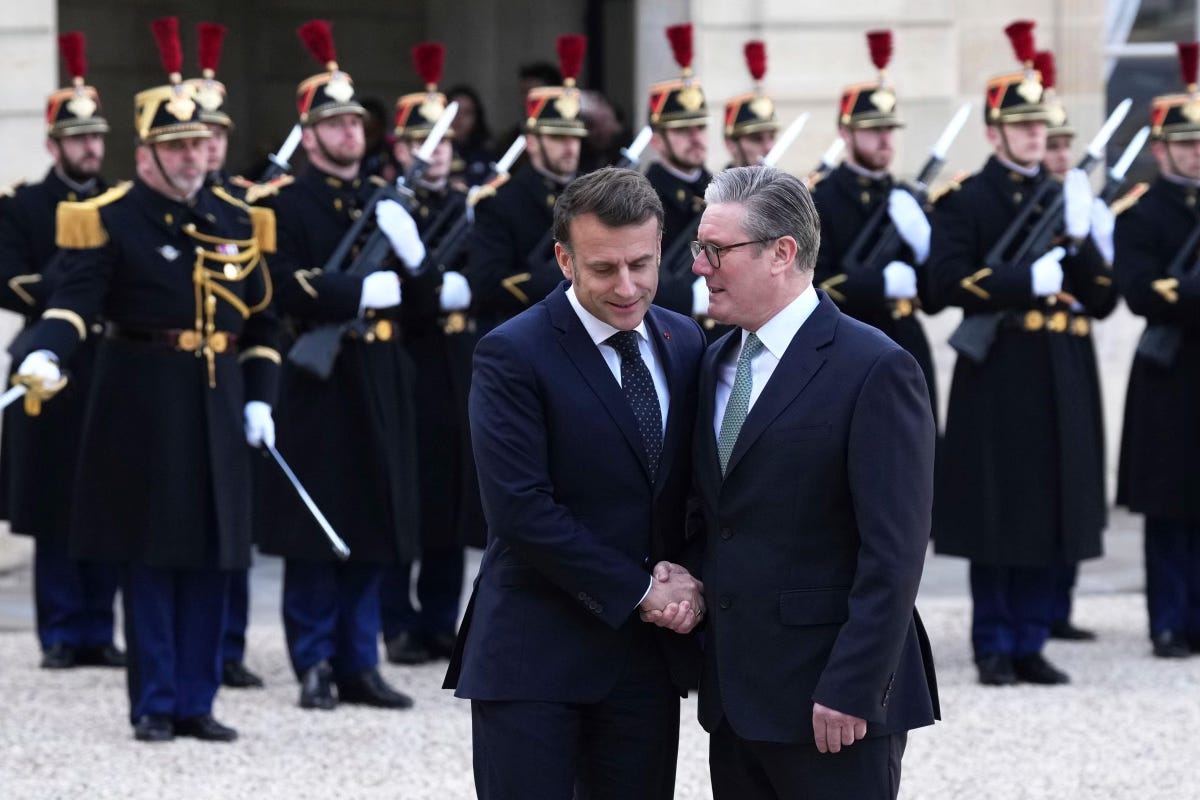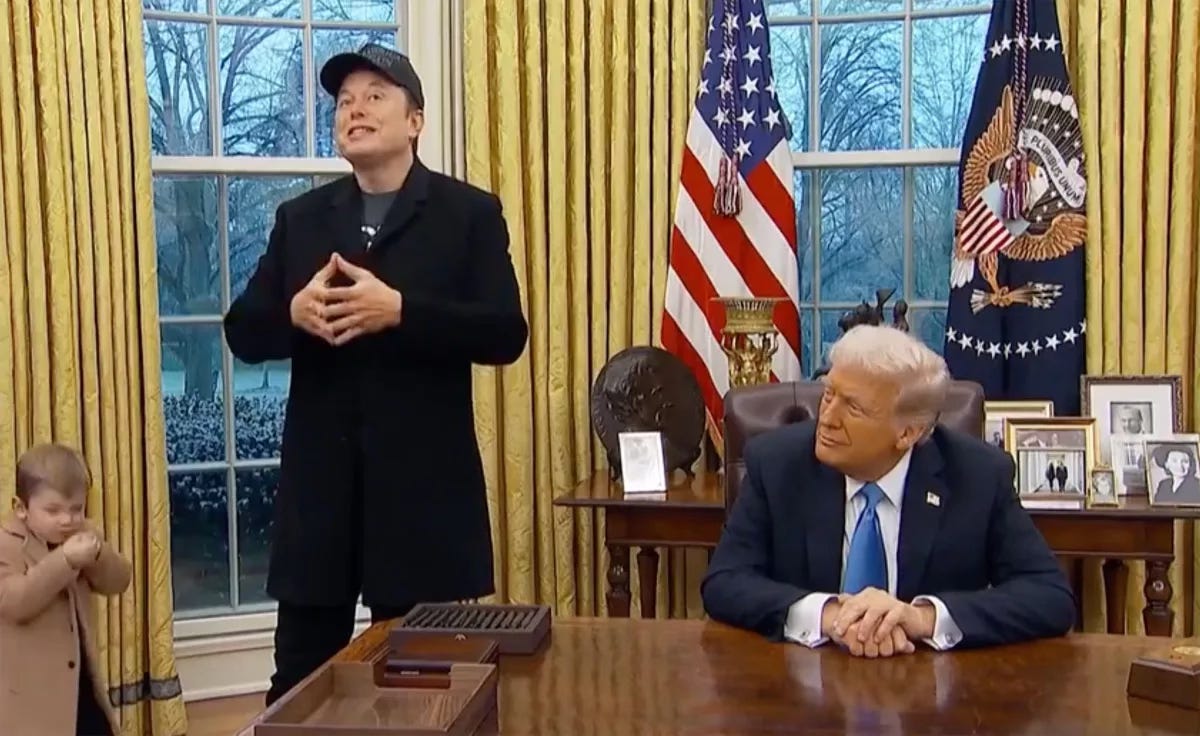Keir Starmer urged European nations to be "absolutely clear" that any security guarantee relating to a Ukraine peace deal "must be with a US backstop", following emergency meetings in Paris this evening, which he labelled a “once in a generation moment for the collective security of Europe".
The long overdue talks on strengthening European security - hosted by Macron and attended by the likes of German Chancellor Olaf Scholz, Poland’s Donald Tusk, Italy’s Giorgia Meloni, NATO boss Mark Rutte and EU chief Ursula von der Leyen - came as Russian and US diplomats gear up for peace negotiations tomorrow, 3,000 miles away in Riyadh. Negotiations from which Europe has been excluded.
Speaking to reporters as he emerged from today’s talks at the Elysee Palace, Starmer alluded to Washington’s reluctance to act as Europe’s security guarantor, insisting it was time for the continent to step up and take responsibility for its own security: “We have to recognise the new era we are in, not cling hopelessly to the comforts of the past”, he cautioned.
At the same time, his demand for a US backstop shows a recognition too that, even if Europe assumes greater responsibility for its own security, if a peace agreement is to hold and Putin is to be deterred from further aggression, support from Washington remains critical.
In the lead-up to the Paris meeting, Starmer confirmed for the first time that he is “ready and willing” to put British troops on the ground in Ukraine to enforce any peace deal.
These troops would form part of a peacekeeping force, sent once a ceasefire has been negotiated, to ensure it holds and isn’t just a temporary peace before an emboldened Putin invades fresh territory.
There isn’t a clear European consensus on this issue. Sweden has said it will not rule out sending peacekeeping troops, the UK and France are in favour, while Germany and Spain have said it is “premature” to talk of sending troops to Ukraine. Poland’s Donald Tusk has insisted that Kyiv’s allies must “immediately” boost defence spending but he is “not planning to send Polish troops to Ukrainian territory”.
However, the reality is that any of Kyiv’s allies would be highly reluctant to put boots on the ground without some form of US backing.
As Iain Martin writes in his latest newsletter, European leaders have spent years paying lip service to strengthening European security while under-spending on defence. Meaning the harsh reality is that “the US has almost all the heavy lift capability required to move forces around and, without it, we are stuffed in a European conflict.”
Last year, a report by the Commons defence committee warned that the British military has been “hollowed out” to such an extent that the army is incapable of fighting a peer-to-peer war beyond eight weeks.
There would need to be a very clear mandate on what is expected of troops in a peacekeeping force and, crucially, it would have to be a large enough force to act as a genuine deterrent - or, in the worst case scenario, to defeat a Russian incursion. Military analysts reckon this would mean 100,000 troops as a bare minimum.
European leaders will be hoping that, even if Washington refuses to send any troops to prop up a peacekeeping force, it may still agree to offer support via other means - for instance by providing the force with air cover, without which Europe may well lack adequate air defences.
As Starmer’s comments today demonstrate, he is under no illusion about Europe’s dependence on Washington: “A US security guarantee is essential for a lasting peace, because only the US can deter Putin from attacking again”, he explained.
Next week, Starmer is heading to Washington DC to discuss the so-called “special relationship” with Donald Trump.
While Starmer will be seeking security guarantees from the US, Trump will be more interested in securing a clear commitment from Britain that it is going to ramp up defence spending. The UK government’s current position is that it won’t make any further promises until the upcoming defence review has been published.
Irreconcilable differences on Ukraine’s future have upended any notion of Euro-Atlantic unity. They also create a huge challenge for Starmer. He is talking about the UK leading but the truth is Britain’s armed forces have been underfunded and hollowed out. As the crisis grows, demands are only going to grow for the UK to get serious and spend much more on defence.
Caitlin Allen
Deputy Editor
ON REACTION TODAY
Maggie Pagano
Labour should scrap its ill-conceived family farm tax
Iain Martin
Europe screwed
Ian Stewart
On ageing, migration and growth
ALSO KNOW
NHS progress - The government has met its election pledge of delivering two million extra NHS appointments in England in its first year, the prime minister has said. The target was achieved between July and November last year, when there were almost 2.2 million more elective care appointments compared to the same period in 2023.
Blocked asylum claims from Afghan commandos - UK Special Forces officers rejected resettlement applications from more than 2,000 Afghan commandos who served with them, the Ministry of Defence has confirmed for the first time.
Washington enrages Beijing - China has told the US to “rectify its mistakes”, after it removed previous wording on its State Department website which said “We do not support Taiwan independence". Beijing’s foreign ministry says the revision "sends a seriously wrong message to Taiwan independence separatist forces".
Thames Water reckoning - A judge will rule tomorrow whether Thames Water can borrow an emergency £3bn from creditors. If the plan is rejected, the company could be temporarily renationalised.
FIVE THINGS
Gordon Sander in EI on Virginia Cowles, a woman in search of trouble
BBC Future on Pathfinder 1: The airship that could usher in a new age
The FT on China’s unspoken question: who will succeed Xi Jinping?
The Islamic State is making a comeback, warns Foreign Policy
The Conversation on Syria’s mass graves and why accounting for the dead and disappeared is crucial for the nation to heal






